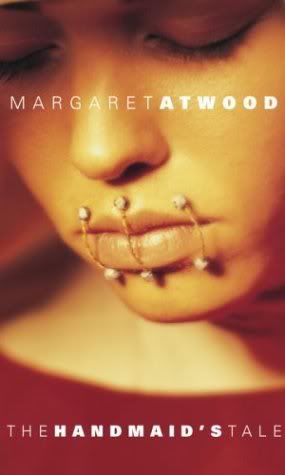 The Plot: It is the world of the near future, and Offred is a Handmaid in the home of the Commander and his wife. She is allowed out once a day to the food market, she is not permitted to read, and she is hoping the Commander makes her pregnant, because she is only valued if her ovaries are viable. Offred can remember the years before, when she was an independent woman, had a job of her own, a husband and child. But all of that is gone now...everything has changed. (Taken from the Seal Books website)
The Plot: It is the world of the near future, and Offred is a Handmaid in the home of the Commander and his wife. She is allowed out once a day to the food market, she is not permitted to read, and she is hoping the Commander makes her pregnant, because she is only valued if her ovaries are viable. Offred can remember the years before, when she was an independent woman, had a job of her own, a husband and child. But all of that is gone now...everything has changed. (Taken from the Seal Books website) The Review: To be completely honest, I wasn’t sure I was going to enjoy this book. Since I’m not a fan of most speculative fiction, the subject matter was something that didn’t necessarily interest me, and my memories of reading Atwood in high school were far from rosy. After the first 50 pages or so, I felt a bit validated in my preconceived notions because they were a bit of a slog to get through.
But like many of the beliefs I had in high school, this one also turned out to be baseless.* Simply put, Atwood’s The Handmaid’s Tale is far better than I could ever have anticipated, and the novel is proving difficult for me to review since it hasn’t really left me in the few days since I finished reading it. It also turns out that my initial thoughts about the first fifty pages or so were also wrong, because once I finished the novel I re-read those parts and realized that while they are definitely slow, they also do an excellent job of world building. Atwood’s dystopia is a rare case of speculative fiction where everything seems fully realized.
Throughout the novel, Offred remembers her friend Moira, both in the time before and after the United States became the Republic of Gilead. By all accounts, Moira was the spirited one in the relationship, and when the change happened, she was the one to be proactive and attempt an escape. Her character arc seemed to be sliding towards one where she would end up being a symbol of hope for the Handmaids, but her story is just as tragic as any other. The question of what her character represents is a bit troubling to me since Moira doesn’t meet a happy ending, and if she’s supposed to represent the futility of struggling against patriarchal oppression, then I find that a woefully depressing interpretation.
I’ve read some views of Offred where people tend to see her as weak and undeserving of being saved, especially when contrasted against Moira, who was fiercely independent and seemed to be in more in charge of her own fate. I don’t find myself believing that though, because despite whatever faults Offred has, her passivity in relation to the situation handed to her are very much human. It is understandable for someone to distrust a measure of freedom after being indoctrinated against it. She manages to buck the rules when she can, but rather than take chances that would likely find her dead, she instead focuses on surviving. That is what she ends up being in the end, a survivor. Even though she had no idea of their fate, the memory of her husband and daughter is enough to keep her sane, and in the end that is enough.
Perhaps the thing I find most unsettling about the novel is how the attitudes towards women aren’t that far of a stretch from the ones many people hold today, and how they remain believable despite being taken to an extreme. The Republic’s objectification of women and desire to have them be nothing more than child bearers or housewives with no real responsibilities outside of the household is a wonderfully sly condemnation of traditional values by Atwood. Her ability to showcase how actuated ideals can be disastrous and hazardous to society is truly stunning.
Like I said above, this was a hard novel for me to review, so if my thoughts are poorly articulated, I’m sorry.
The Package: The cover itself might be a bit on the nose for the novel thematically, but it’s fairly attractive. Included at the back of the book are discussion questions, an author’s note and interview, and a short overview of Atwood’s career up to that point.
The Score: 4.5 Machines that Margaret Atwood uses instead of signing books herself out of 5.
*For the record, I’ve also come to accept the Russian’s aren’t out to get me.

